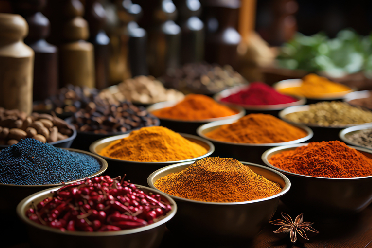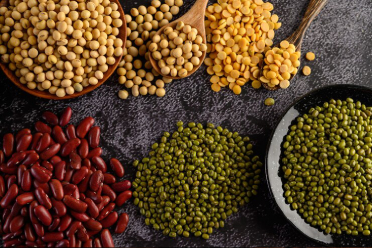Blog Details

Exploring the Spice of Life: A Guide to Essential Spices and Their Benefits
Spices have been an integral part of human civilization for centuries, adding flavor, aroma, and even medicinal properties to our food. From the exotic to the everyday, spices enhance culinary experiences and offer numerous health benefits. In this blog, we delve into the world of spices, exploring their origins, uses, and the unique advantages they bring to the table.
What Are Spices?
Spices are aromatic substances derived from plants' seeds, fruits, roots, or bark, used primarily for flavoring, coloring, or preserving food. They can be used fresh, dried, whole, or ground, each form imparting a distinct taste profile to dishes.
Popular Spices and Their Benefits
-
Turmeric
- Origin: Native to Southeast Asia, turmeric is known for its vibrant yellow color and earthy flavor.
- Health Benefits: Contains curcumin, a powerful anti-inflammatory and antioxidant compound. Turmeric is believed to support joint health, aid digestion, and promote overall well-being.
-
Cinnamon
- Origin: Cinnamon comes from the bark of trees native to Southeast Asia.
- Health Benefits: High in antioxidants, cinnamon can help regulate blood sugar levels, reduce inflammation, and may have antimicrobial properties. It adds warmth and sweetness to both sweet and savory dishes.
-
Cumin
- Origin: Originating from the Mediterranean and Middle Eastern regions, cumin seeds have a warm, nutty flavor.
- Health Benefits: Rich in iron and antioxidants, cumin aids digestion, supports immune function, and may help improve blood cholesterol levels.
-
Ginger
- Origin: Ginger root is native to Southeast Asia and has a spicy, slightly sweet flavor.
- Health Benefits: Known for its anti-nausea properties, ginger also has anti-inflammatory effects and may help alleviate muscle pain and reduce oxidative stress.
-
Paprika
- Origin: Made from dried and ground Capsicum annuum peppers, paprika originates from Central and South America.
- Health Benefits: Paprika is rich in vitamins A and E, antioxidants that support eye health, immune function, and skin health. It adds a mild, sweet flavor and vibrant color to dishes.
Culinary Uses of Spices
Spices are versatile and can transform ordinary dishes into extraordinary culinary experiences:
- Seasoning: Enhance meats, vegetables, and soups with a pinch of your favorite spice.
- Marinades: Create flavorful marinades by combining spices with oils, citrus juices, and herbs.
- Baking: Add warmth to baked goods like cakes, cookies, and bread with spices like cinnamon, nutmeg, and cloves.
- Beverages: Spices like ginger and cinnamon can elevate teas, coffees, and cocktails with their distinct flavors.
Tips for Using Spices
-
Storage: Store spices in airtight containers away from heat and sunlight to preserve their flavor and potency.
-
Experiment: Don’t be afraid to experiment with different spice combinations to discover unique flavor profiles.
-
Freshness: Use whole spices and grind them as needed for fresher flavors. Ground spices lose their potency more quickly.
Conclusion
Spices are more than just flavor enhancers; they offer a myriad of health benefits and can elevate your culinary creations to new heights. By incorporating a variety of spices into your diet, you not only enhance the taste of your meals but also promote overall well-being. Embrace the diversity of spices and savor the richness they bring to your kitchen and health.


